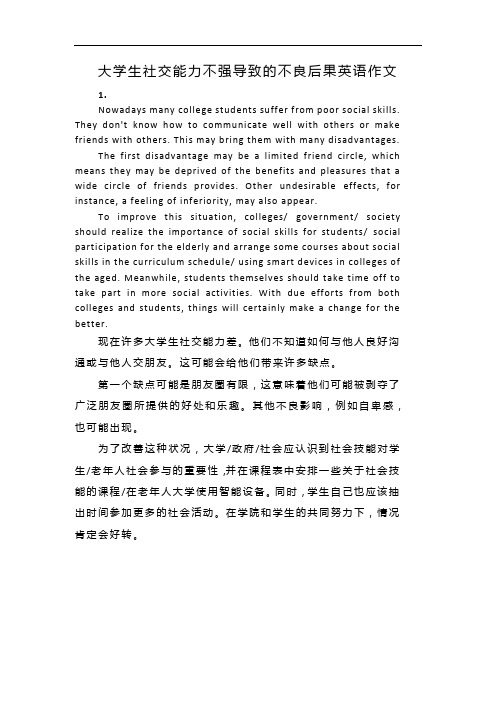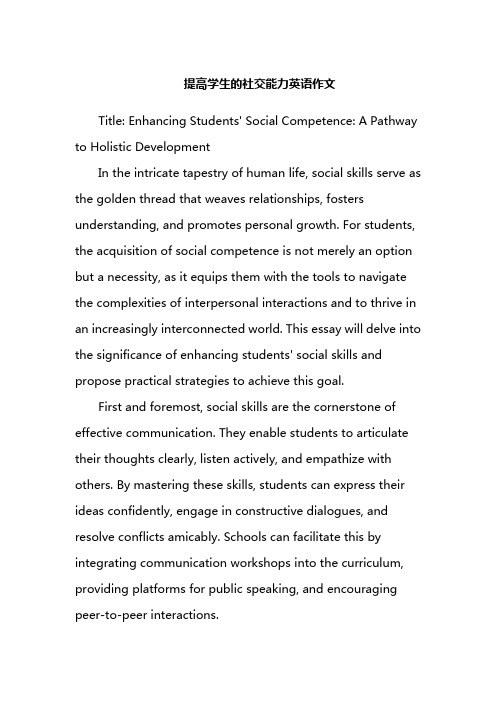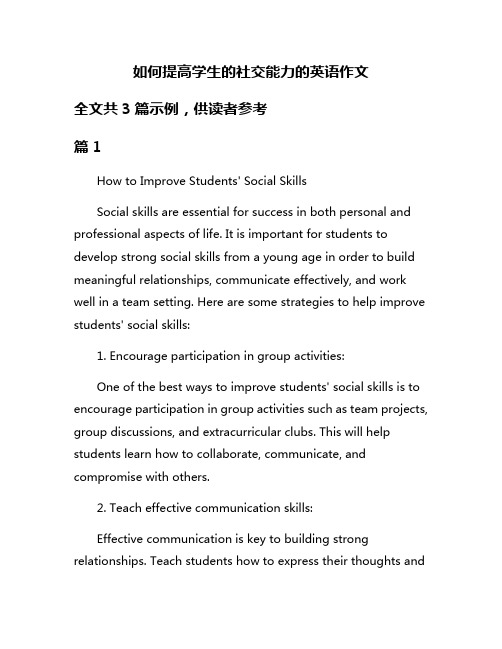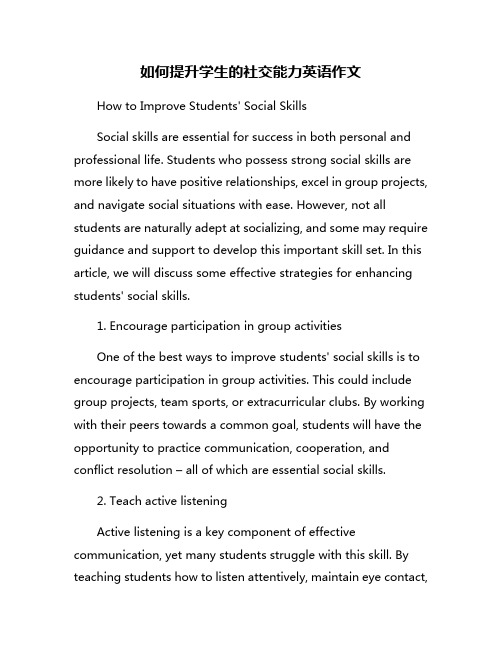青少年缺乏社交能力的原因英语作文
大学生社交能力不强导致的不良后果英语作文

大学生社交能力不强导致的不良后果英语作文1.Nowadays many college students suffer from poor social skills. They don't know how to communicate well with others or make friends with others. This may bring them with many disadvantages.The first disadvantage may be a limited friend circle, which means they may be deprived of the benefits and pleasures that a wide circle of friends provides. Other undesirable effects, for instance, a feeling of inferiority, may also appear.To improve this situation, colleges/ government/ society should realize the importance of social skills for students/social participation for the elderly and arrange some courses about social skills in the curriculum schedule/ using smart devices in colleges of the aged. Meanwhile, students themselves should take time off to take part in more social activities. With due efforts from both colleges and students, things will certainly make a change for the better.现在许多大学生社交能力差。
大学生处理不好人际关系的英语作文原因

大学生处理不好人际关系的英语作文原因 College life, a transition from the sheltered world of high school to the more independent and complex realm of adulthood, often brings about various challenges for students. One such challenge that many college students struggle with is handling interpersonal relationships effectively. This struggle can be attributed to several reasons, ranging from psychological and emotional factors to environmental and social pressures.Firstly, the psychological and emotional factors play a crucial role in determining how college students manage their interpersonal relationships. The transition to college life can be overwhelming for many students, as they are exposed to new environments, people, and expectations. This adjustment period can lead to feelings of loneliness, anxiety, and even depression, which can negatively impact their ability to form and maintain healthy relationships. Moreover, college students often face significant emotional fluctuations as they navigate their way through the complexities of adulthood. They may be dealing with issues such as identity crises, self-doubt, and feelings ofinadequacy, all of which can hinder their ability to communicate effectively and build meaningful relationships. Secondly, environmental and social pressures also contribute to the difficulties that college students experience in handling interpersonal relationships. The college environment, being highly competitive and demanding, often leaves students with little time and energy to focus on their social lives. The pressure to excel academically, engage in extracurricular activities, and establish asocial network can be immense, leading to feelings of isolation and stress.Additionally, social media and technology have further complicated the interpersonal dynamics among college students. With the constant flow of information and the ability to compare oneself to others, students may feel pressure to perform and fit a certain mold, which can leadto feelings of inadequacy and anxiety.Lastly, the lack of conflict resolution skills and effective communication techniques among college students also contributes to their difficulties in handling interpersonal relationships. Navigating through differencesand disputes can be challenging, especially when lackingthe necessary tools and strategies to do so effectively.The inability to communicate one's thoughts, feelings, and needs can lead to misunderstandings and conflicts, further exacerbating the issue.In conclusion, the challenges that college studentsface in handling interpersonal relationships aremultifaceted and complex. The psychological and emotional factors, environmental and social pressures, as well as the lack of conflict resolution skills and effective communication techniques all play a role in this struggle.It is, therefore, crucial for colleges and universities to provide students with the necessary support and resourcesto help them navigate these challenges and establishhealthy and meaningful relationships.**大学生处理不好人际关系的英语作文原因分析**大学生活,作为从高中的庇护所到成年更独立、更复杂世界的过渡,经常给学生们带来各种挑战。
大学生提升社交能力是有必要的英语作文

大学生提升社交能力是有必要的英语作文Improving Social Skills is Necessary for College StudentsSocial skills are a crucial aspect of life, especially for college students. As young adults enter a new phase of their lives, they are exposed to a variety of social situations that require them to interact with peers, professors, employers, and other individuals. In college, social skills are not only important for building relationships but also for networking, teamwork, and personal development. Therefore, it is essential for college students to actively work on improving their social skills in order to succeed both academically and professionally.One of the main reasons why college students need to enhance their social skills is to build strong relationships. In college, students have the opportunity to meet new people from diverse backgrounds, cultures, and interests. By developing good communication, listening, and empathy skills, students can establish meaningful connections with their peers, professors, and other members of the college community. These relationships can provide support, guidance, and networking opportunities that can be beneficial throughout their academic and professional careers.Moreover, social skills are essential for working effectively in a team. In college, students often have to collaborate with their classmates on group projects, assignments, and extracurricular activities. By improving their ability to communicate, cooperate, and resolve conflicts, students can contribute positively to the success of the team and achieve common goals. Developing strong teamwork skills can also help students prepare for future careers that require collaboration with colleagues and clients.Additionally, social skills play a key role in networking and building professional connections. College students who possess good communication, networking, and interpersonal skills are more likely to form relationships with potential mentors, employers, and industry professionals. These connections can lead to internship opportunities, job offers, and career advancement. By attending networking events, career fairs, and workshops, students can improve their social skills and increase their chances of success in the job market.Furthermore, enhancing social skills can promote personal growth and emotional intelligence. College students who are adept at expressing their thoughts, emotions, and concerns can develop self-awareness and self-regulation. By understanding their own strengths and weaknesses, students can set realisticgoals, make informed decisions, and manage stress effectively. Additionally, by connecting with others on a deeper level, students can cultivate empathy, compassion, and respect for diversity, which are essential qualities for building a harmonious and inclusive society.In conclusion, college students need to prioritize the development of their social skills in order to thrive in today's competitive and interconnected world. By building strong relationships, improving teamwork, networking effectively, and cultivating emotional intelligence, students can enhance their academic performance, career prospects, and personalwell-being. Therefore, it is important for colleges and universities to provide resources, programs, and support services that can help students enhance their social skills and succeed in all areas of their lives.。
如何提升学生的社交能力英语作文

如何提升学生的社交能力英语作文English: One effective way to improve students' social skills is to encourage them to participate in group activities and collaborative projects. By working in teams, students have the opportunity to communicate with their peers, share ideas, and collaborate to achieve a common goal. This not only helps them develop effective communication and teamwork skills but also fosters empathy, understanding, and respect for others. In addition, organizing extracurricular activities such as debates, role-playing, and group discussions can help students enhance their critical thinking, public speaking, and negotiation skills while interacting with their peers in a supportive environment. Furthermore, promoting extracurricular clubs and organizations can provide students with opportunities to connect with like-minded individuals and develop their social networks. By creating a supportive, inclusive, and collaborative learning environment, educators can help students build their confidence, resilience, and interpersonal skills, preparing them for success in their future personal and professional endeavors.中文翻译: 为提升学生的社交能力,一个有效的方法是鼓励他们参与小组活动和合作项目。
提高学生的社交能力英语作文

提高学生的社交能力英语作文Title: Enhancing Students' Social Competence: A Pathway to Holistic DevelopmentIn the intricate tapestry of human life, social skills serve as the golden thread that weaves relationships, fosters understanding, and promotes personal growth. For students, the acquisition of social competence is not merely an option but a necessity, as it equips them with the tools to navigate the complexities of interpersonal interactions and to thrive in an increasingly interconnected world. This essay will delve into the significance of enhancing students' social skills and propose practical strategies to achieve this goal.First and foremost, social skills are the cornerstone of effective communication. They enable students to articulate their thoughts clearly, listen actively, and empathize with others. By mastering these skills, students can express their ideas confidently, engage in constructive dialogues, and resolve conflicts amicably. Schools can facilitate this by integrating communication workshops into the curriculum, providing platforms for public speaking, and encouraging peer-to-peer interactions.Secondly, social competence fosters a sense of community and belonging. In an environment where students feel valued and understood, they are more likely to participate actively in group activities and contribute to a positive classroom atmosphere. Teachers can cultivate this by organizing team-building exercises, group projects, and social events that encourage collaboration and mutual support. These activities not only enhance social skills but also instill a sense of responsibility and teamwork.Moreover, social skills are essential for emotional and mental well-being. They empower students to manage their emotions effectively, seek support when needed, and build resilience. Schools can support this by offering counseling services, conducting workshops on emotional intelligence, and promoting a culture of openness and acceptance. By equipping students with the ability to handle emotional challenges, we prepare them to face life's adversities with grace and strength.To further enhance students' social skills, schools should encourage cultural awareness and inclusivity. In a globalized world, the ability to interact respectfully with people from diverse backgrounds is crucial. By exposing students todifferent cultures, languages, and perspectives, schools can broaden their horizons and foster a spirit of tolerance and respect. This can be achieved through international exchange programs, multicultural festivals, and inclusive education practices that celebrate diversity.In conclusion, enhancing students' social skills is a multifaceted endeavor that requires a collaborative effort from educators, students, and the community. By prioritizing communication, fostering a sense of community, promoting emotional intelligence, and cultivating cultural awareness, schools can equip students with the social competence needed to succeed in the 21st century. This, in turn, will not only benefit the individual but also contribute to the creation of a more harmonious and connected society.。
如何提高学生的社交能力的英语作文

如何提高学生的社交能力的英语作文全文共3篇示例,供读者参考篇1How to Improve Students' Social SkillsSocial skills are essential for success in both personal and professional aspects of life. It is important for students to develop strong social skills from a young age in order to build meaningful relationships, communicate effectively, and work well in a team setting. Here are some strategies to help improve students' social skills:1. Encourage participation in group activities:One of the best ways to improve students' social skills is to encourage participation in group activities such as team projects, group discussions, and extracurricular clubs. This will help students learn how to collaborate, communicate, and compromise with others.2. Teach effective communication skills:Effective communication is key to building strong relationships. Teach students how to express their thoughts andideas clearly, listen actively, and show empathy towards others. Encourage them to practice these skills in various social situations.3. Promote self-awareness and emotional intelligence:Help students develop self-awareness and emotional intelligence by teaching them how to recognize and manage their own emotions, as well as understand the emotions of others. This will help them build stronger relationships and resolve conflicts more effectively.4. Provide opportunities for social interaction:Create plenty of opportunities for students to interact socially, both inside and outside the classroom. Encourage them to engage in conversations, make new friends, and participate in social events in order to improve their social skills.5. Teach problem-solving and conflict resolution skills:Teach students how to effectively resolve conflicts and solve problems in a constructive manner. Encourage them to communicate openly, listen to different perspectives, and work towards finding mutually beneficial solutions.6. Foster a positive and inclusive environment:Create a positive and inclusive environment where students feel safe and supported to express themselves and interact with others. Encourage respect, empathy, and kindness towards one another to promote healthy social interactions.7. Provide feedback and guidance:Offer feedback and guidance to students on their social interactions. Provide constructive criticism, praise their efforts, and offer suggestions for improvement in order to help them grow and develop their social skills.In conclusion, improving students' social skills is essential for their personal and academic success. By implementing these strategies and fostering a supportive environment, educators can help students develop strong social skills that will benefit them throughout their lives. Remember that social skills can be learned and improved with practice, so encourage students to step out of their comfort zones and engage in social interactions to build confidence and competence in their social abilities.篇2How to Improve Students' Social SkillsIntroductionSocial skills play a crucial role in a student's success both in and out of the classroom. Students who possess strong social skills are able to communicate effectively, work well in group settings, and build positive relationships with their peers. However, many students struggle with social skills, which can impact their academic performance and overall well-being. In this essay, we will discuss various strategies that educators and parents can use to help improve students' social skills.1. Encourage CommunicationOne of the key components of developing strong social skills is the ability to communicate effectively. Educators can help students improve their communication skills by creating a supportive and inclusive classroom environment where students feel comfortable expressing their thoughts and ideas. Teachers can also incorporate activities that encourage students to engage in conversations with their peers, such as group projects, debates, and role-playing exercises.2. Teach EmpathyEmpathy is another important aspect of social skills, as it allows students to understand and relate to the feelings of others. Educators can promote empathy among students by incorporating lessons on social and emotional learning into thecurriculum. Additionally, teachers can encourage students to practice empathy by promoting acts of kindness and highlighting the importance of considering others' perspectives and feelings.3. Foster CollaborationCollaboration is a valuable skill that not only improves students' social skills but also prepares them for the workforce. Educators can foster collaboration by assigning group projects that require students to work together to achieve a common goal. Teachers can also teach students the importance of teamwork and effective communication when working in a group setting.4. Provide Social Skills TrainingIn some cases, students may require more targeted intervention to improve their social skills. Educators can provide social skills training through programs and workshops that focus on topics such as communication, conflict resolution, and assertiveness. Parents can also support their child's social skills development by enrolling them in extracurricular activities that promote social interaction, such as sports teams, music lessons, or community service activities.5. Encourage Positive Peer RelationshipsPeer relationships play a significant role in the development of social skills. Educators and parents can support students in building positive peer relationships by encouraging friendships, promoting inclusivity, and addressing conflicts in a constructive manner. Teachers can also facilitate activities that encourage students to get to know their peers on a deeper level, such as class discussions, icebreakers, and team-building exercises.ConclusionImproving students' social skills is essential for their academic success and overall well-being. By implementing strategies that focus on communication, empathy, collaboration, social skills training, and positive peer relationships, educators and parents can help students develop the social skills they need to thrive in both their academic and personal lives. By fostering a supportive and inclusive environment that promotes social skill development, educators and parents can empower students to become confident, empathetic, and socially competent individuals.篇3Title: How to Improve Students' Social SkillsIn today's fast-paced and increasingly digital world, social skills are more important than ever. From making friends to networking for future careers, having strong social skills can greatly impact a person's success and happiness in life. As educators, it is essential that we help students develop these crucial skills. In this essay, we will discuss various strategies and techniques that can be used to improve students' social skills.First and foremost, it is important to create a positive and inclusive classroom environment. Students need to feel comfortable and safe in order to be open to developing their social skills. Teachers should encourage collaboration, group work, and discussions in the classroom. By providing opportunities for students to interact with their peers in a supportive setting, they can practice and improve their communication and interpersonal skills.In addition, teachers can incorporate social skills training into their lesson plans. This can involve explicit instruction on topics such as active listening, conflict resolution, empathy, and teamwork. Role-playing exercises, group projects, and class debates can all help students practice these skills in a structured and guided way.Furthermore, it is important for educators to model positive social behavior themselves. Teachers can demonstrate good communication skills, empathy, and respect for others in their interactions with students. By serving as a role model, teachers can inspire students to emulate these behaviors and develop their own social skills.Outside of the classroom, extracurricular activities can also be a valuable way to improve students' social skills. Joining clubs, teams, or volunteer organizations can provide students with opportunities to interact with their peers in different contexts. These activities can help students learn how to work collaboratively, resolve conflicts, and build relationships outside of the academic setting.Parents can also play a crucial role in supporting their children's social development. Encouraging open communication, teaching social etiquette, and providing opportunities for social interaction outside of school can all help students build their social skills. Parents can also set a good example by modeling positive social behavior at home.In conclusion, developing strong social skills is essential for students' success in both school and life. By creating a positive and inclusive classroom environment, incorporating social skillstraining into lessons, modeling positive social behavior, participating in extracurricular activities, and receiving support from parents, students can improve their communication, empathy, and teamwork skills. As educators, it is our responsibility to help students cultivate these essential skills and prepare them for a successful future.。
如何提升学生的社交能力英语作文

如何提升学生的社交能力英语作文How to Improve Students' Social SkillsSocial skills are essential for success in both personal and professional life. Students who possess strong social skills are more likely to have positive relationships, excel in group projects, and navigate social situations with ease. However, not all students are naturally adept at socializing, and some may require guidance and support to develop this important skill set. In this article, we will discuss some effective strategies for enhancing students' social skills.1. Encourage participation in group activitiesOne of the best ways to improve students' social skills is to encourage participation in group activities. This could include group projects, team sports, or extracurricular clubs. By working with their peers towards a common goal, students will have the opportunity to practice communication, cooperation, and conflict resolution – all of which are essential social skills.2. Teach active listeningActive listening is a key component of effective communication, yet many students struggle with this skill. By teaching students how to listen attentively, maintain eye contact,and ask clarifying questions, educators can help them become better conversationalists and more empathetic individuals.3. Role-playing exercisesRole-playing exercises can be a fun and effective way to help students practice social skills in a safe and controlled environment. Teachers can create scenarios that require students to engage in conversations, resolve conflicts, or work together to solve a problem. By participating in these activities, students can gain confidence and improve their social competence.4. Provide opportunities for peer feedbackPeer feedback can be a valuable tool for helping students improve their social skills. Encourage students to give and receive constructive criticism from their peers, focusing on areas where they can improve their communication or interpersonal skills. This can help students identify their strengths and weaknesses and make adjustments accordingly.5. Offer social skills trainingIn some cases, students may benefit from more structured social skills training. This could involve workshops or seminars focused on topics such as assertiveness, conflict resolution, or emotional intelligence. By providing students with theopportunity to learn and practice these skills, educators can help them develop the confidence and competence needed to succeed in social situations.6. Foster a supportive and inclusive classroom environmentCreating a supportive and inclusive classroom environment is essential for helping students feel comfortable and confident in their social interactions. Teachers can promote empathy, respect, and understanding among students, and encourage them to celebrate diversity and difference. By fostering a sense of belonging and acceptance, educators can help students develop strong social skills and positive relationships.In conclusion, developing strong social skills is a key aspect of students' overall well-being and success. By implementing the strategies outlined in this article, educators can help students improve their communication, collaboration, and interpersonal skills, setting them up for success in both their academic and personal lives.Reference:- Teaching Social Skills: Tools for Promoting Positive Behavior by Rebecca A. Moyes- The Social Skills Guidebook: Managing Shyness, Conflict Resolution, and Self-Esteem by Chris MacLeod。
网络给青少年带来的弊端英语作文

网络给青少年带来的弊端英语作文【中英文版】The internet, a double-edged sword, has brought numerous benefits to our lives, but it also poses significant drawbacks, especially for teenagers.On one hand, it is a treasure trove of information and knowledge, but on the other hand, it can be a detrimental influence that hampers their growth and development.互联网是一把双刃剑,它在给我们的生活带来无数便利的同时,也对青少年造成了诸多弊端。
一方面,它是信息和知识的宝库,另一方面,它可能成为阻碍青少年成长和发展的负面影响源。
Firstly, excessive internet usage can lead to isolation and a decline in social skills among teenagers.Spending numerous hours online chatting or gaming may replace face-to-face interactions, resulting in the loss of essential communication abilities.首先,过度使用互联网会导致青少年产生孤独感,并降低他们的社交技能。
将大量时间花在在线聊天或游戏上可能会取代面对面的交流,从而丧失必要的沟通能力。
Secondly, the internet is filled with inappropriate content that is not suitable for teenagers.Exposure to violent or pornographic materials can have a detrimental effect on their mental health and worldview.其次,互联网上充斥着不适合青少年的不当内容。
- 1、下载文档前请自行甄别文档内容的完整性,平台不提供额外的编辑、内容补充、找答案等附加服务。
- 2、"仅部分预览"的文档,不可在线预览部分如存在完整性等问题,可反馈申请退款(可完整预览的文档不适用该条件!)。
- 3、如文档侵犯您的权益,请联系客服反馈,我们会尽快为您处理(人工客服工作时间:9:00-18:30)。
The reason why teenagers lack social skills
In the development of modern society, social ability is a very important ability, but often found from the adolescent stage from the lack of social ability, which is caused by it? The first is the impact of the environment. Environment is the first factor that affects people, and it is also the reason that brings up people's character. Nowadays, the growth stage of teenagers is basically learning. The basic task of every day is to attend various tutoring classes. Grades are the only criterion to measure them, this way leads to the students have no time to communicate, to meet new friends, naturally weak communication skills. Next is the parents' approval degree is not high causes the teenager's not self-confident. There is nothing wrong with parents being strict with their children, but this can lead to more and more people denying themselves and being afraid. Their lack of self-confidence also makes them afraid to express themselves, which weakens their social skills. Parents' encouragement and companionship will make the child more brave to take the first step.
The most fundamental reason for the weak social ability of adolescents is the above two aspects, as long as the two aspects can change the social ability of adolescents.。
